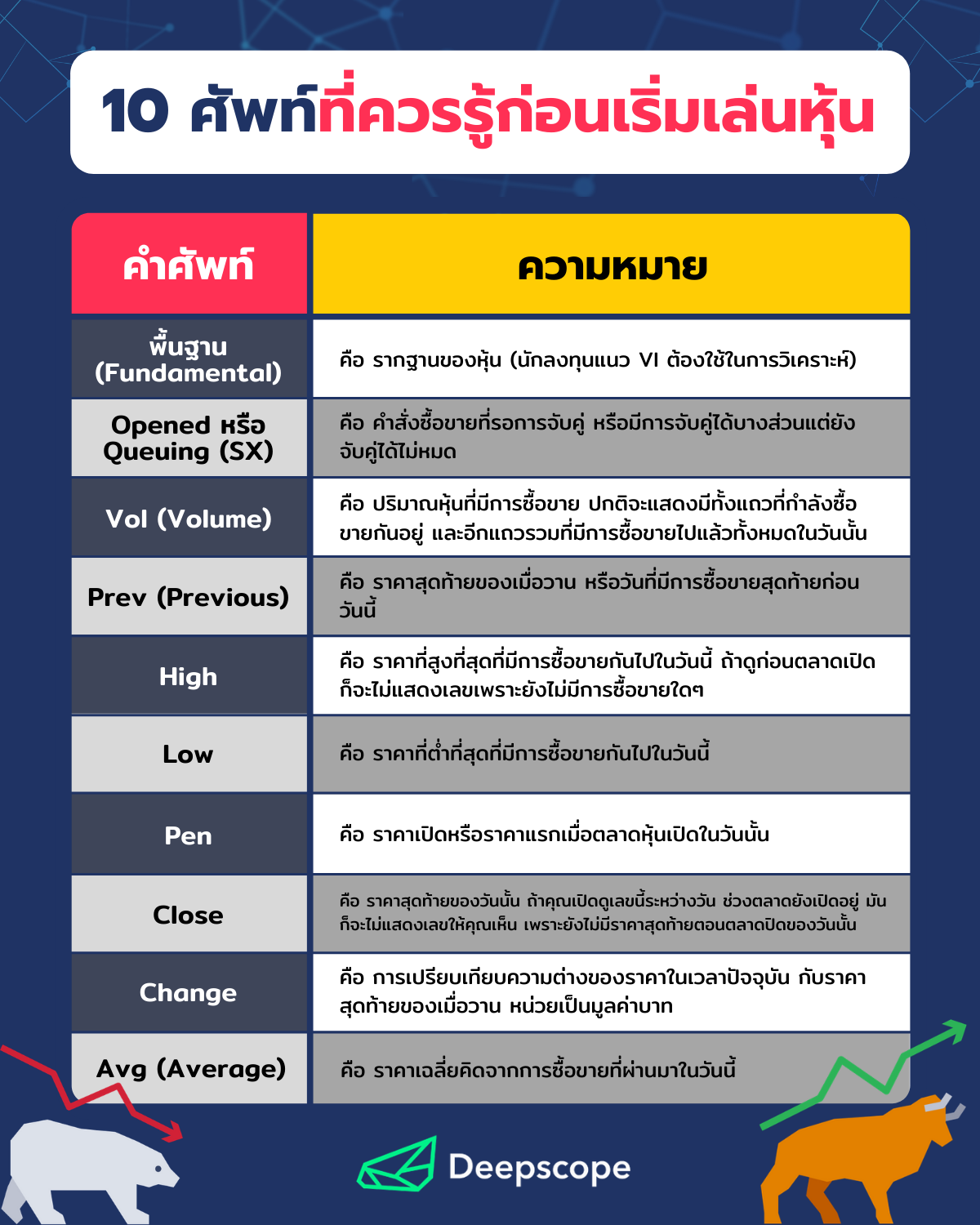ตลาดหุ้น ภาษา อังกฤษ: การเรียนรู้เกี่ยวกับการลงทุนในตลาดโลก
ตลาดหุ้น ภาษา อังกฤษ: การเรียนรู้เกี่ยวกับการลงทุนในตลาดโลก
คำศัพท์ภาษาอังกฤษเกี่ยวกับหุ้น|ตลาดหุ้น|หุ้น|การลงทุน|Stock|
Keywords searched by users: ตลาดหุ้น ภาษา อังกฤษ เทรดหุ้น ภาษาอังกฤษ, พอร์ตหุ้น ภาษาอังกฤษ, เข้าตลาดหลักทรัพย์ ภาษาอังกฤษ, กองทุน ภาษาอังกฤษ, จดทะเบียนตลาดหลักทรัพย์ ภาษาอังกฤษ, Stock market, นักเทรดหุ้น ภาษาอังกฤษ, เล่นหุ้น ภาษาอังกฤษ pantip
Understanding the Stock Market (ตลาดหุ้น ภาษา อังกฤษ): A Comprehensive Guide
The stock market, known as “ตลาดหุ้น” in Thai, plays a pivotal role in global finance, offering opportunities for investment and financial growth. Understanding its mechanisms, significance, analysis tools, trading strategies, and legal aspects is crucial for anyone seeking to engage with it. This comprehensive guide aims to delve deeply into the Thai stock market, providing valuable insights and practical guidance for both beginners and experienced investors.
1. การเข้าใจเกี่ยวกับตลาดหุ้น (Understanding the Stock Market)
The stock market refers to a platform where shares of publicly traded companies are bought and sold. It acts as a marketplace for securities, enabling investors to participate in the ownership of companies and potentially gain from their growth. Understanding its basics, such as stocks, indices, and market dynamics, is fundamental before venturing into this financial realm.
2. ความสำคัญและบทบาทของตลาดหุ้น (Significance and Role of the Stock Market)
The significance of the stock market lies in its role as a barometer of economic health. It facilitates capital formation, allowing companies to raise funds for expansion and innovation. Additionally, it offers individuals the opportunity to grow wealth through investment in promising companies.
3. วิเคราะห์และการทำความเข้าใจเกี่ยวกับตลาดหุ้น (Analysis and Understanding of the Stock Market)
Analyzing the stock market involves assessing various factors such as company performance, market trends, and economic indicators. Fundamental and technical analysis are common approaches used by investors to make informed decisions regarding stock purchases or sales.
4. เครื่องมือและทรัพยากรสำหรับการศึกษาเกี่ยวกับตลาดหุ้น (Tools and Resources for Stock Market Education)
Numerous resources, including online platforms, financial publications, and seminars, are available to educate individuals about the stock market. Utilizing these resources helps in gaining a deeper understanding of investment strategies and market trends.
5. การซื้อขายและกฎหมายเกี่ยวกับตลาดหุ้น (Trading and Legal Aspects of the Stock Market)
Executing trades in the stock market involves adhering to legal regulations and market protocols. Understanding the trading process, brokerage accounts, and regulatory compliance is crucial to avoid legal complications.
6. ผลกระทบของตลาดหุ้นต่อเศรษฐกิจและการเงิน (Impact of the Stock Market on the Economy and Finance)
The stock market’s performance has a significant impact on economic indicators like GDP and employment rates. Moreover, it influences investor confidence, consumer spending, and the overall financial landscape.
7. วิธีการวางแผนการลงทุนในตลาดหุ้น (Planning Investment in the Stock Market)
Developing an investment plan involves setting clear financial goals, assessing risk tolerance, and diversifying investments. A well-thought-out strategy can help navigate market fluctuations and achieve long-term financial objectives.
8. การเทรดและกลยุทธ์ที่ดีในการลงทุนในตลาดหุ้น (Trading and Effective Investment Strategies)
Implementing effective trading strategies involves analyzing market trends, using tools like stop-loss orders and setting realistic profit targets. Additionally, understanding different investment styles, such as value investing or growth investing, aids in making informed decisions.
FAQs (คำถามที่พบบ่อย)
Q: มีแหล่งข้อมูลไหนที่เหมาะสำหรับผู้เริ่มต้นที่ต้องการเรียนรู้เกี่ยวกับตลาดหุ้นในภาษาอังกฤษหรือไม่?
A: มีแหล่งข้อมูลหลากหลาย เช่น เว็บไซต์การเงินออนไลน์, หนังสือ, และคอร์สออนไลน์ที่ให้ความรู้เกี่ยวกับพื้นฐานและกลยุทธ์การลงทุนในตลาดหุ้น
Q: การวางแผนการลงทุนในตลาดหุ้นควรเริ่มต้นอย่างไร?
A: การวางแผนการลงทุนควรเริ่มจากการกำหนดเป้าหมายการเงิน, การประเมินความเสี่ยง, และการกระจายลงทุนในสินทรัพย์หลากหลายเพื่อลดความเสี่ยง
Q: ตลาดหุ้นมีผลต่อเศรษฐกิจอย่างไร?
A: การแสดงผลทางเศรษฐกิจผูกพันกับดัชนีตลาดหลักทรัพย์ เช่น การเปลี่ยนแปลงของดัชนีหุ้นสามารถมีผลต่อความเชื่อมั่นของนักลงทุนและการใช้จ่ายของผู้บริโภค
This guide aims to provide a comprehensive understanding of the stock market in Thai (ตลาดหุ้น ภาษา อังกฤษ). Referencing reliable sources and engaging with educational materials will further enhance your grasp of this intricate financial landscape, empowering you to make informed investment decisions.
Categories: อัปเดต 62 ตลาดหุ้น ภาษา อังกฤษ

(n) stock exchange, Syn. ตลาดหลักทรัพย์, ตลาดค้าหุ้น, Example: วิกฤติการณ์ในอ่าวเปอร์เซียส่งผลกระทบต่อตลาดหุ้นทั่วโลก, Count Unit: หุ้น, Thai Definition: ตลาดหรือสถานที่อันเป็นศูนย์กลางในการซื้อขายหลักทรัพย์, Notes: (ปาก)
เทรดหุ้น ภาษาอังกฤษ
เทรดหุ้น ภาษาอังกฤษ: A Comprehensive Guide to Stock Trading
In the dynamic world of finance, stock trading has emerged as a prominent avenue for individuals seeking to invest and grow their wealth. For those in Thailand, navigating the intricacies of stock trading in the English language (เทรดหุ้น ภาษาอังกฤษ) may seem like a daunting task. This article aims to serve as a comprehensive guide, offering detailed information and explaining key concepts to assist both beginners and seasoned investors.
Understanding Stock Trading (เทรดหุ้น)
What is Stock Trading?
Stock trading, or เทรดหุ้น in Thai, involves the buying and selling of shares in publicly listed companies. Investors purchase shares with the expectation that their value will increase over time, allowing them to sell at a profit.
Stock Market Basics
The stock market serves as a platform where buyers and sellers trade shares. In Thailand, the Stock Exchange of Thailand (SET) is the primary exchange facilitating these transactions. Understanding the basics of the stock market, including how it operates and the factors influencing stock prices, is crucial for successful trading.
Key Terminology
To navigate the world of stock trading in English, familiarizing yourself with key terminology is essential. Websites like Longdo Dictionary and Langhub provide valuable resources for translating stock market terms. Some common terms include “stock price” (ราคาหุ้น), “dividend” (เงินปันผล), and “market capitalization” (มูลค่าหลักทรัพย์ตลาด).
Steps to Start Stock Trading in Thailand
1. Educate Yourself
Before diving into stock trading, educate yourself on fundamental concepts. Explore online resources, attend seminars, and consider enrolling in courses to gain a solid understanding of the market.
2. Open a Trading Account
To participate in stock trading, you need to open a trading account with a brokerage firm. Research different brokers, considering factors such as fees, user interface, and customer support, before making a decision.
3. Conduct Research
Thorough research is essential for making informed investment decisions. Analyze financial reports, study market trends, and stay updated on news that may impact stock prices.
4. Develop a Trading Strategy
Establish a clear trading strategy that aligns with your financial goals and risk tolerance. Whether you prefer day trading, swing trading, or long-term investing, having a well-defined strategy is crucial.
5. Monitor and Adjust
Regularly monitor your portfolio and stay informed about market developments. Be prepared to adjust your strategy based on changing market conditions.
Frequently Asked Questions (FAQs)
Q1: What is the SET?
A1: The Stock Exchange of Thailand (SET) is the main stock exchange in Thailand, where stocks of publicly listed companies are bought and sold.
Q2: How do I calculate market capitalization?
A2: Market capitalization is calculated by multiplying the current stock price by the total number of outstanding shares of a company.
Q3: Are there risks involved in stock trading?
A3: Yes, stock trading involves risks. Prices can fluctuate, and there is a possibility of losing money. It’s crucial to conduct thorough research and diversify your investments.
Q4: Can foreigners trade stocks in Thailand?
A4: Yes, foreigners can trade stocks on the SET. However, certain regulations and restrictions may apply.
Q5: How do I stay updated on stock market news?
A5: Utilize financial news websites, subscribe to newsletters, and follow reputable financial analysts on social media to stay informed about market trends.
In conclusion, เทรดหุ้น ภาษาอังกฤษ opens up a world of opportunities for Thai investors. By understanding the basics, conducting thorough research, and developing a sound trading strategy, individuals can navigate the stock market with confidence. Remember to stay informed, continuously educate yourself, and adapt to the dynamic nature of the financial landscape. Happy trading!
พอร์ตหุ้น ภาษาอังกฤษ
พอร์ตหุ้น ภาษาอังกฤษ: A Comprehensive Guide to Stock Portfolios in Thai
Introduction:
In the fast-paced world of finance, understanding the intricacies of stock portfolios is essential for investors seeking long-term success. This article aims to provide a detailed guide to พอร์ตหุ้น (Stock Portfolios) in the Thai language, offering valuable insights, explaining key concepts, and providing essential information to help investors navigate the dynamic landscape of the stock market.
I. Understanding พอร์ตหุ้น (Stock Portfolios):
A. Definition and Basics:
พอร์ตหุ้น refers to a collection of stocks or securities held by an individual or entity. This diverse portfolio is carefully curated to achieve specific financial goals, whether it be capital appreciation, income generation, or risk mitigation. Investors build portfolios to balance potential returns with acceptable levels of risk.
B. Components of a Stock Portfolio:
-
Stocks (หุ้น): Stocks represent ownership in a company and are a fundamental component of a portfolio. Investors can choose from various types of stocks, including common stocks, preferred stocks, and growth stocks.
-
Bonds (ตราสารหนี้): Bonds are debt securities issued by governments or corporations. They provide a fixed income stream through periodic interest payments and return of principal at maturity.
-
Mutual Funds (กองทุนรวม): Mutual funds pool money from multiple investors to invest in a diversified portfolio of stocks, bonds, or other securities. This offers investors instant diversification and professional management.
II. Building a Successful Stock Portfolio:
A. Setting Financial Goals:
Before constructing a portfolio, investors must define their financial objectives, risk tolerance, and investment horizon. Whether the goal is wealth accumulation, retirement planning, or income generation, a clear understanding of objectives is crucial.
B. Diversification Strategies:
-
Asset Allocation: Allocating assets among different classes, such as stocks, bonds, and cash, helps manage risk. The right mix depends on the investor’s goals, time horizon, and risk tolerance.
-
Sector Diversification: Spreading investments across various sectors reduces the impact of poor performance in a single industry.
-
Geographic Diversification: Investing in companies from different regions or countries provides a global perspective and minimizes exposure to regional risks.
III. Key Concepts in Stock Portfolios:
A. Risk and Return:
Understanding the risk-return trade-off is essential. Higher returns often come with increased risk. Balancing risk and return is crucial for achieving financial goals without exposing the portfolio to unnecessary volatility.
B. Market Analysis:
Regular market analysis involves evaluating economic indicators, company financials, and market trends. This helps investors make informed decisions and adapt their portfolios to changing market conditions.
C. Portfolio Monitoring and Rebalancing:
Continuous monitoring and periodic rebalancing ensure that the portfolio aligns with the investor’s goals and risk tolerance. This involves buying or selling assets to maintain the desired asset allocation.
FAQ Section:
-
What is the importance of diversification in a stock portfolio?
Diversification helps spread risk by investing in a variety of assets. This reduces the impact of poor performance in a single investment, enhancing the overall stability of the portfolio. -
How can investors assess their risk tolerance?
Investors can assess risk tolerance by considering factors such as their financial goals, time horizon, and emotional ability to handle market fluctuations. Online risk tolerance assessments are also available. -
What role does asset allocation play in portfolio construction?
Asset allocation involves dividing investments among different asset classes to achieve specific objectives. The right mix depends on an investor’s goals, risk tolerance, and investment horizon. -
How often should a stock portfolio be rebalanced?
The frequency of portfolio rebalancing depends on market conditions and changes in an investor’s financial situation. Many financial experts recommend reviewing and rebalancing a portfolio annually.
Conclusion:
In conclusion, constructing and managing a successful stock portfolio requires a deep understanding of key concepts, diligent research, and a disciplined approach. Investors in the Thai market can benefit significantly from adopting sound portfolio management practices, aligning their investments with financial goals, and staying informed about market trends.
By adhering to the principles outlined in this comprehensive guide to พอร์ตหุ้น ภาษาอังกฤษ, investors can enhance their financial well-being and navigate the complexities of the stock market with confidence.
เข้าตลาดหลักทรัพย์ ภาษาอังกฤษ
เข้าตลาดหลักทรัพย์ภาษาอังกฤษ: คู่มือและข้อมูลอธิบายอย่างละเอียด
เข้าตลาดหลักทรัพย์เป็นกระบวนการทางการเงินที่มีความสำคัญอย่างมากในการลงทุนและการเสนอขายหลักทรัพย์ต่างๆ ซึ่งเป็นส่วนหนึ่งของโลกการเงินที่ซับซ้อนและน่าทึ่ง ในบทความนี้เราจะพาท่านไปสำรวจเกี่ยวกับเข้าตลาดหลักทรัพย์ภาษาอังกฤษอย่างละเอียดเพื่อเสริมสร้างความเข้าใจในเรื่องนี้ได้อย่างแท้จริง
การเข้าตลาดหลักทรัพย์คืออะไร?
การเข้าตลาดหลักทรัพย์หมายถึงการซื้อขายหลักทรัพย์ เช่น หุ้นของบริษัท หรือตราสารที่เท่าเทียมกับการลงทุน ซึ่งสามารถซื้อหรือขายได้ในตลาดที่เฉพาะเจาะจงนั้น เช่น ตลาดหลักทรัพย์แห่งประเทศไทย (SET) หรือตลาดต่างประเทศอื่นๆ เช่น ตลาดหลักทรัพย์ในสหรัฐอเมริกา (NYSE) หรือตลาดในประเทศอังกฤษ (LSE) เป็นต้น
วัตถุประสงค์ของการเข้าตลาดหลักทรัพย์
การเข้าตลาดหลักทรัพย์มักเกี่ยวข้องกับการลงทุนเพื่อการผลกำไร นักลงทุนสามารถซื้อหรือขายหลักทรัพย์ต่างๆ เพื่อมุ่งหวังให้ได้กำไรจากการเปลี่ยนแปลงของราคาหลักทรัพย์นั้นๆ หรืออาจมุ่งหวังให้ได้รับเงินปันผลจากการถือหลักทรัพย์ในระยะยาว
ขั้นตอนการเข้าตลาดหลักทรัพย์
-
การศึกษาและการวางแผน: การเข้าตลาดหลักทรัพย์ควรเริ่มต้นด้วยการศึกษาและการวางแผนอย่างถี่ถ้วน เพื่อเข้าใจเกี่ยวกับตลาดและการลงทุนที่ต้องการทำ
-
เปิดบัญชีการซื้อขายหลักทรัพย์: ต่อมาคือการเปิดบัญชีที่สามารถใช้ในการซื้อขายหลักทรัพย์ในตลาดที่เลือก
-
การวิเคราะห์หลักทรัพย์และตลาด: การวิเคราะห์ราคาหลักทรัพย์และสภาวะตลาดเป็นสิ่งสำคัญ เพื่อการตัดสินใจในการลงทุน
-
การทำรายการซื้อขาย: เมื่อเตรียมพร้อมแล้ว นักลงทุนสามารถทำรายการซื้อหรือขายหลักทรัพย์ตามแผนที่กำหนดไว้
คำถามที่พบบ่อย (FAQ)
1. เข้าตลาดหลักทรัพย์มีความเสี่ยงอย่างไร?
การลงทุนในตลาดหลักทรัพย์มีความเสี่ยงที่มากน้อยต่างกัน การเสี่ยงของการลงทุนขึ้นอยู่กับประเภทของหลักทรัพย์และสภาวะตลาดในแต่ละช่วงเวลา
2. มีเครื่องมือใดช่วยในการวิเคราะห์หลักทรัพย์ได้บ้าง?
มีเครื่องมือหลายชนิด เช่น การวิเคราะห์ทางเทคนิค (Technical Analysis) และการวิเคราะห์ทางพื้นฐาน (Fundamental Analysis) เป็นต้น
3. ต้องมีทุนเท่าไรในการลงทุนในตลาดหลักทรัพย์?
จำนวนทุนที่ต้องการจะลงทุนขึ้นอยู่กับวัตถุประสงค์และการวางแผนการลงทุนของแต่ละบุคคล สำหรับบางคนอาจลงทุนน้อยเพื่อความมั่นคง ในขณะที่บางคนอาจมีการลงทุนมากขึ้นเพื่อการผลกำไรที่สูงขึ้น
เข้าตลาดหลักทรัพย์เป็นทางเลือกที่น่าสนใจสำหรับการลงทุน แต่ควรศึกษาและวางแผนอย่างถี่ถ้วนก่อนการตัดสินใจ เพื่อลดความเสี่ยงและเพิ่มโอกาสในการทำกำไรให้มากที่สุดได้
ผู้อ่านสามารถศึกษาเพิ่มเติมได้จากแหล่งอ้างอิงต่างๆที่ได้ระบุไว้ข้างต้นเพื่อเรียนรู้เพิ่มเติมเกี่ยวกับเข้าตลาดหลักทรัพย์ภาษาอังกฤษได้อย่างละเอียดและอ่านภาษาอังกฤษได้ดีขึ้น
สรุป
การเข้าตลาดหลักทรัพย์ภาษาอังกฤษเป็นกระบวนการทางการเงินที่ท้าทายและน่าสนใจ การศึกษาและการวางแผนอย่างถี่ถ้วนเป็นสิ่งสำคัญในการลงทุนในตลาดนี้ ความเข้าใจในหลักการและกฎข้อบังคับของตลาดหลักทรัพย์จะช่วยให้การลงทุนของท่านมีโอกาสสำเร็จมากยิ่งขึ้น
หวังว่าบทความนี้จะเป็นประโยชน์และเสริมความรู้เกี่ยวกับการเข้าตลาดหลักทรัพย์ภาษาอังกฤษอย่างละเอียดและเป็นประโยชน์สำหรับผู้ที่สนใจในการลงทุนในตลาดหลักทรัพย์ทั้งในประเทศและต่างประเทศ
FAQ (คำถามที่พบบ่อย)
1. เข้าตลาดหลักทรัพย์หมายความว่าอะไร?
เข้าตลาดหลักทรัพย์หมายถึงการลงทุนหรือซื้อขายหลักทรัพย์ เช่น หุ้น หรือตราสารที่แลกเปลี่ยนได้ในตลาดที่เฉพาะเจาะจง
2. การเข้าตลาดหลักทรัพย์มีประโยชน์อย่างไร?
การเข้าตลาดหลักทรัพย์ช่วยให้นักลงทุนมีโอกาสในการลงทุนและทำกำไรจากการซื้อขายหลักทรัพย์ต่างๆ
3. การลงทุนในตลาดหลักทรัพย์มีความเสี่ยงอย่างไร?
การลงทุนในตลาดหลักทรัพย์มีความเสี่ยงตามสภาวะตลาดและการเปลี่ยนแปลงของราคาหลักทรัพย์นั้นๆ
4. ต้องมีทุนเท่าไรในการลงทุนในตลาดหลักทรัพย์?
การตั้งค่าทุนในการลงทุนขึ้นอยู่กับวัตถุประสงค์และการวางแผนการลงทุนของแต่ละบุคค
รวบรวม 42 ตลาดหุ้น ภาษา อังกฤษ



![Cashury] เครื่องหมายท้ายชื่อหุ้น แต่ละตัวคืออะไร? นักลงทุนมือใหม่อาจสงสัยถึงตัวอักษรภาษาอังกฤษที่อยู่ต่อท้ายชื่อหุ้น บางวันก็มี บางวันก็ไม่มี แล้วหุ้นบางตัวก็มีตัวอักษรภาษาอังกฤษที่ไม่เหมือนกันอีก ซึ่งตัวอักษร Cashury] เครื่องหมายท้ายชื่อหุ้น แต่ละตัวคืออะไร? นักลงทุนมือใหม่อาจสงสัยถึงตัวอักษรภาษาอังกฤษที่อยู่ต่อท้ายชื่อหุ้น บางวันก็มี บางวันก็ไม่มี แล้วหุ้นบางตัวก็มีตัวอักษรภาษาอังกฤษที่ไม่เหมือนกันอีก ซึ่งตัวอักษร](https://t1.blockdit.com/photos/2021/03/6050e013ccf6bc0a9943d8ea_800x0xcover_fsS0tPR3.jpg)



See more here: cacanh24.com
Learn more about the topic ตลาดหุ้น ภาษา อังกฤษ.
- ตลาดหุ้น แปลว่าอะไร ดูความหมาย ตัวอย่างประโยค หมายความว่า …
- *ตลาดหลักทรัพย์* แปลว่าอะไร ดูความหมาย ตัวอย่างประโยค …
- ตลาดหุ้น – Langhub – เรียนภาษาอังกฤษ
- stock market (【คำนาม】ตลาดหุ้น ) ความหมาย, วิธีใช้ และ …
- ความเป็นมาและบทบาท – ตลาดหลักทรัพย์แห่งประเทศไทย
- ศัพท์ภาษาอังกฤษเกี่ยวกับหุ้น สำหรับมือใหม่หัดเทรด | เรียน …
See more: https://cacanh24.com/category/local blog





